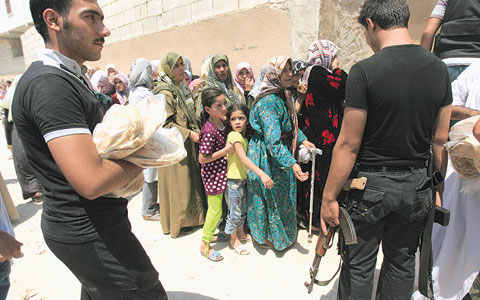The talk of the town—or rather the country—in Lebanon has fixated on the great influx of Syrian and Palestinian refugees. Sadly, such talk is not about their physical, social and psychological suffering, but largely about their very presence in Lebanon and what it means to a delicate demographic and sectarian balance.
It is unfortunately true that the refugees will put a strain on the country's limited resources and shake its fragile polity: the refugees have increased Lebanon's population by 10 percent, between 350,000 and half of a million "newcomers." However, the demand by some Lebanese to close the borders is inhumane as well as illegal under international law. This manifestation of the Syrian human tragedy is what Hazem Saghieh has coined "the racism among some Lebanese," now a major topic in social networks and newspaper columns.
In his column in Al Hayat, Saghieh wrote that "all racisms, regardless of their varied emotional and practical manifestations converge on a deep denial of the existing reality. The more 'our situation' deteriorates the more we attribute responsibility to the Other, new comers, and the foreigners." Saghieh details the social, political and economic conditions in Lebanon, which have gradually worsened as a result of a pernicious combination of time and conflict. These reversals, Saghieh asserts, exposed certain "folktales" and "mythologies" such as Lebanon being the "Switzerland" of the Middle East, as well as the continued denial of the realities of Lebanon’s own civil war, with the subtle implication that what took place between 1975 and 1989 was the "others' wars on Lebanese soil."
Racism is a psychological projection, whereby "some" Lebanese blame Syrian refugees for problems predating the Syrian revolution. The Lebanese house was not in order to start with, and those responsible for this disorder are, as usual, blaming someone else. Who better to blame than the Syrians? Racism often attributes certain social ills to national or religious groups who differ from them, and this is exactly what the Syrian refugees are experiencing in Lebanon. They are the victims of Lebanese anger and frustrations over the many past internal and external setbacks the country has suffered.
In fairness, there is nothing peculiar about the Lebanese blaming others for their shortcomings and their social and economic "defeats." Hitler blamed the Jews for all the misfortunes that had befallen Germany during and after the First World War. There are infinite examples of similar behaviors by other nations. In times of high unemployment and economic hardships in the United States it was easy to blame the undocumented immigrants.
What, then, is special about "racism among some Lebanese?" Are we suggesting that racism is a result of a country's political and economic setbacks or the demystification of perceived images of itself? No. Every country has its own racists, and Lebanon is not an exception.
But racism and stereotyping are more widespread in Lebanon than elsewhere, and sectarianism is certainly a major factor in this. Since divisions in the country are largely along sectarian and religious lines, racist attitudes are largely interrelated with religious identity. Thus, their utility as an ideological weapon. Despite much talk of democracy in Lebanon, the country never had a genuine liberal democracy because democracy is inconsistent with a sectarian system, which Lebanon adopted in its two constitutions in 1943 and again 1989 with the Taif accord. Consequently, Lebanon has always been dubbed as a "pseudo democracy."
A genuine liberal democracy would have meant the emergence of a vibrant civil and pluralistic society, allowing a clash of ideas along other than sectarian and confessional lines. Such a system would have debunked sectarianism by laying down the basis of a critical education and culture, tolerance and even the introduction of some antidotes to racism: all of theses things would have benefitted the Lebanese and the Syrian refugees, never mind whose side they are on.
Elie Chalala
© Copyright 2013 AL JADID MAGAZINE

